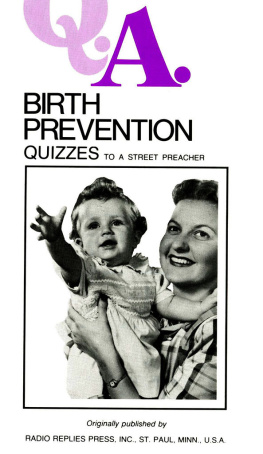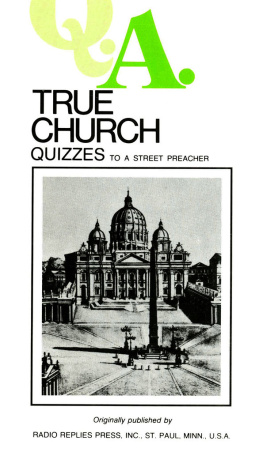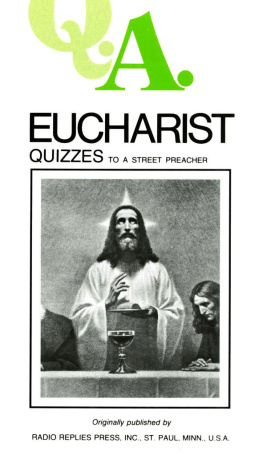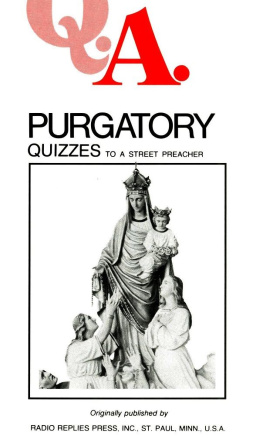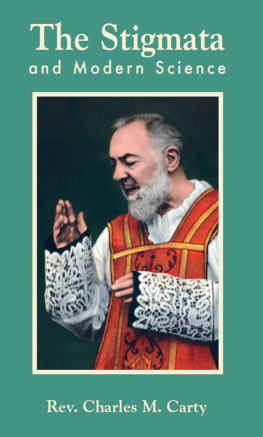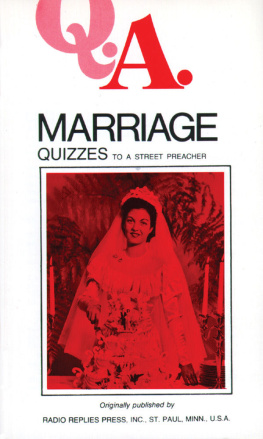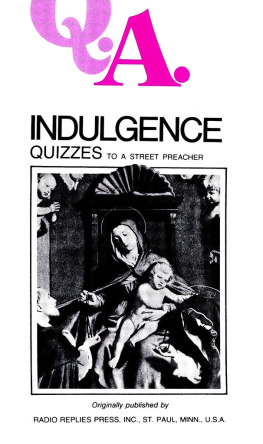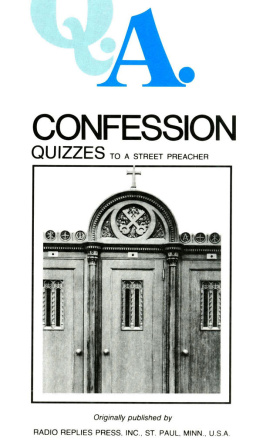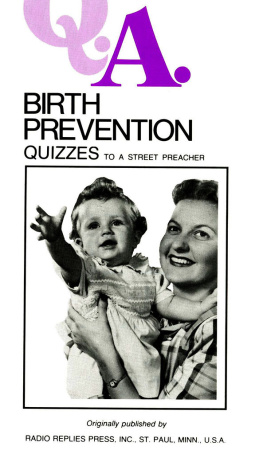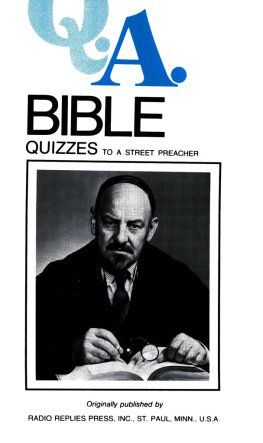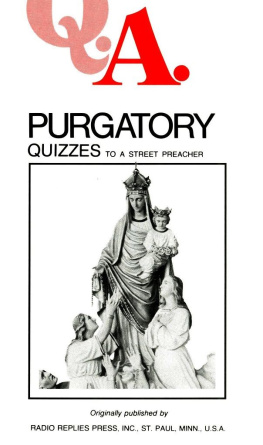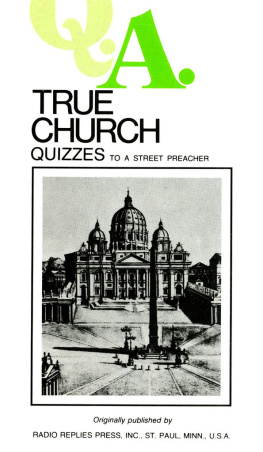Birth Prevention Quizzes
to a Street Preacher
Fr. Chas. M. Carty
&
Rev. Dr. L. Rumble, M.S.C.
IMPRIMATUR: Joannes Gregorius Murray
Archiepiscopus Sancti Pauli.
Written by
Fr. Chas. M. Carty
&
Rev. Dr. L. Rumble, M.S.C.
Copyright 1976 by TAN Books
Originally published by
Fathers Rumble and Carty
Radio Replies Press, Inc.
St. Paul, Minn., U.S.A.
Complete and Unabridged
TAN Books
Charlotte, North Carolina
www.TANBooks.com
1976
CONTENTS
BIRTH PREVENTION QUIZZES TO A STREET PREACHER
1. Why is the Catholic Church opposed to birth control?
She is not opposed to controlling the number of children by lawful means , such as self-control and by mutual consent to abstain from the use of marital privileges. But she is opposed to birth control as commonly understood to mean the prevention of conception after indulgence in actions calculated to result in the generation of children. The use of such privileges and the deliberate frustration of their normal effects is a very grave sin against the law of God because its ultimate implication is the destruction of the human race. And for this reason the Catholic Church cannot but forbid it. Birth controllers have eliminated births, says Chesterton, and made control unnecessary. Birth control is the one thing that can persuade selfish mortals to be systematically selfish and to dodge responsibility.
2. Birth rate is falling in both Catholic and Protestant countriesTherefore birth control is widespread.
That is true, but the less Catholic the country, the greater the fall or decline. Where Protestantism is strongest, the fall is devastating. In Catholic countries containing a Protestant and irreligious element, a decline is noticeable, though it is due chiefly to the non-Catholic element and to such weak Catholics as are affected by the new paganism. In the Catholic country of Italy things are ever so much better than in other countries.
3. Birth control has come to stay.
Contraception by various methods flourished in the pagan civilization of Rome in the early days of Christianity. Pagan Rome went to pieces. But Christians refused to indulge in the evil practice. In the 3rd century, Origen wrote to the pagan Celsus, "Christians marry, as do others, and they have children. They do not stifle their offspring." Despite the boast that our civilization is Christian, paganism has been revived by non-Catholics, with open advocacy of birth control. And the non-Catholic social fabric is doomed if birth control continues. But no man can say that birth control has come to stay. The Catholic Church triumphed over ancient paganism, continuing on her way towards the building up of a new civilization on the ruins of this. She did it before. She can do it again.
4. The Catholic Church is beating the air by opposing birth control.
In stating the moral law, the Church is no more beating the air than was Almighty God in giving the commandments; however, many human beings have refused to observe those commandments. The moral law must be stated. If many men observe it, many will reap happiness; if many break it, many will reap misery. Good Catholics obey the law, and repudiate birth control, both in theory and in practice.
5. Catholics practice birth control as well as Protestants and Jews.
That not all Catholics who live in a morally rotten social fabric are good Catholics, I admit. It is difficult for Catholics to live in a pagan atmosphere without some being contaminated. It was very difficult for the early Christians to live in the pagan atmosphere of Rome, enduring both physical and moral persecution. We hear much about the Christian martyrs but little about the Christian cowards, or lapsed Christians. Today it is even harder for Catholics to stand firm in their principles. Then their opponents were openly pagan. Now they profess to be Christians, and give out their principles of pagan morality in the name of Christianity. The danger is obviously more subtle. But the Catholic Church alone remains firm, and far more Catholics remain true to the teachings of their Church than the superficial might think.
6. No civil or military authority has ever succeeded in suppressing contraception.
That is true. But you overlook religious authority. The religious authority of the Catholic Church did succeed in breaking the immorality of pagan Rome, and it succeeds today in stemming the tide of contraception amongst those of her subjects who are loyal to her, and who have refused to take their cue from the pagans around them. Those who do not accept the authority of the Catholic Church will yield to the dictates of no authority on earth where their personal morals are concerned. And Catholics who have been affected by the loose principles of a non-Catholic environment, and who have weakened in their respect for the authority of Christ and of His Church, have also, alas, been contaminated. But with genuine and faithful Catholics the authority of their Church does succeed in suppressing any temptations to adopt contraceptive methods of birth control.
7. What is the moral law on birth control?
The controlling of birth is lawful if lawful means are used. To control the quality of children, unsuitable people should not marry at all, and that is why the Church makes close blood-relationship an impediment. To control the number of children, parents may by mutual consent practice SELF CONTROL, by continence taking such prudent measures as suggest themselves in order to ensure absence of strong temptation. But the moral law insists that, if they avail themselves of their marital rights, they must do nothing deliberately to prevent God's normal natural laws from taking effect. The apostles of artificial birth control want "fewer births and no control." They wish to render sensuality lawful for its own sake, indulging in actions intended by God to result in children but deliberately frustrating God's intentions. This gratification of desire, for its own sake, whilst deliberately excluding the purpose of such actions, is forbidden by divine law, degrades marriage, reducing it to merely legalized sensuality and is sinful of its very nature. But it is useless to tell proponents of Birth Control that, if it is artificial, it is immoral. Mrs. Margaret Sanger (Birth Control Review 1917) says, "NO LAW IS TOO SACRED TO BE BROKEN." Why reason with such a logician?
8. Can you quote any prohibition from Scripture?
It would not matter if I could not. The general principles are given clearly enough in the Bible, but not every concrete application of those principles. For example, you would admit that it is morally wrong for a man to allow himself to become a drug-fiend, addicted to cocaine, and depriving himself of reason and human responsibility. Yet you could not find in Scripture any text saying, "Thou shalt not become a drug-fiend, addicted to cocaine."
9. Where does the Bible prohibit birth control?
The name birth control is not mentioned in the Bible, for that is a name concocted as a propaganda catch word thirty years ago by the apostles of this vice.
In Gen. 38, 10, you will find a reference, clearly indicating God's mind on the subject. Onan paid the death penalty for frustrating the natural act in the wasting of his seed. "And therefore the Lord slew him, because he did a detestable thing." Jews, Protestants, or Catholics who have this text in their respective Bibles cannot escape the force of this text. St. Augustine, writing in the 4th century, rightly sums up Apostolic tradition on the subject. In his treatise on the sin of adultery, Bk. II, C. 12, he writes: "Marital relations even with a lawful wife, are unlawful and degrading when the conception of a child is deliberately frustrated. This was the sin of Onan, and God struck him dead because of it." We must not forget that the natural moral law is antecedent to all civil and ecclesiastical codes, and even to the ten commandments. The gravity of the punishment meted out to Onan shows the gravity of the crime. Cornelius a Lapide remarks, "If God so punished Onan, what must He think of Christians?"
Next page
